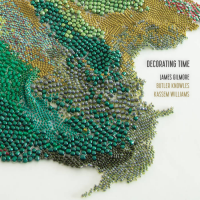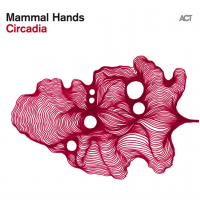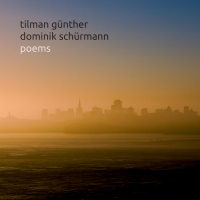Home » Jazz Articles » Album Review » Mia Zabelka & Glen Hall: The Quantum Violin
Mia Zabelka & Glen Hall: The Quantum Violin
Without going into details, the album is said to have been recorded, composed and mixed in the Covid months of 2020 and 2021, in Vienna and Toronto; although it is not explicitly spelled out, this implies that, as with many other Covid collaborations, Zabelka and Hall recorded their parts separately at their home bases and exchanged their recordings. Both are credited with recording, composing, mixing and producing the album, so it is definitely a joint project. That is borne out by the content of the fourteen tracks, which range in length from under two minutes to over six and a half.
The "quantum" of the title does not refer to Zabelka's violin, but indicates that Hall used a quantum oscillator alongside his other devices. The effects of these are all too obvious in the opening track, "The Quantum Violin #1," in which the violin is treated in various ways and for much of the time is subsumed in a storm of white noise; had the album persisted in that vein, long-standing Zabelka fans could well have been scared off. The second track (can you guess its title?) is more of a showcase for the violin, with occasional contributions from Hall that do not overwhelm it, thus creating a piece which manages to maintain a balance between the two players. Thankfully, that equilibrium is maintained throughout most of the tracks, with the violin and electronics together being a creative force rather than sounding like a struggle for supremacy.
The subtle inclusion of voices (from Zabelka and Siratori) in some tracks about halfway through the album was a smart piece of production, as they serve as a reminder that we are listening to music produced by people not machines. The tranquil, pastoral intro to "The Quantum Violin #11" has a similar effect. The closing track, "The Quantum Violin #14—For Pauline Oliveros" harks back to a previous award won by Zabelka, the 2018 Akademia Music Award for her 2017 composition "For Pauline Oliveros." Here, it is restructured by Hall into a drone-based piece with violin accompaniment, the tranquility of which is in marked contrast to the opening track and draws the album to a fittingly exquisite end. Oliveros would no doubt have approved...
Track Listing
The Quantum Violin #1; The Quantum Violin #2; The Quantum Violin #3; The Quantum Violin #4; The Quantum Violin #5; The Quantum Violin #6; The Quantum Violin #7; The Quantum Violin #8; The Quantum Violin #9; The Quantum Violin #10; The Quantum Violin #11; The Quantum Violin #12; The Quantum Violin #13; The Quantum Violin #14 – For Pauline Oliveros.
Personnel
Mia Zabelka
violinGlen Hall
variousAdditional Instrumentation
Mia Zabelka: voice, noise, electronics, experiments & alien objects; Glen Hall: quantum oscillator, OMax, CataRT, experiments & mix; Kenji Siratori: voice (8).
Album information
Title: The Quantum Violin | Year Released: 2021 | Record Label: FMR Records
Tags
PREVIOUS / NEXT
Support All About Jazz
 All About Jazz has been a pillar of jazz since 1995, championing it as an art form and, more importantly, supporting the musicians who make it. Our enduring commitment has made "AAJ" one of the most culturally important websites of its kind, read by hundreds of thousands of fans, musicians and industry figures every month.
All About Jazz has been a pillar of jazz since 1995, championing it as an art form and, more importantly, supporting the musicians who make it. Our enduring commitment has made "AAJ" one of the most culturally important websites of its kind, read by hundreds of thousands of fans, musicians and industry figures every month.




















